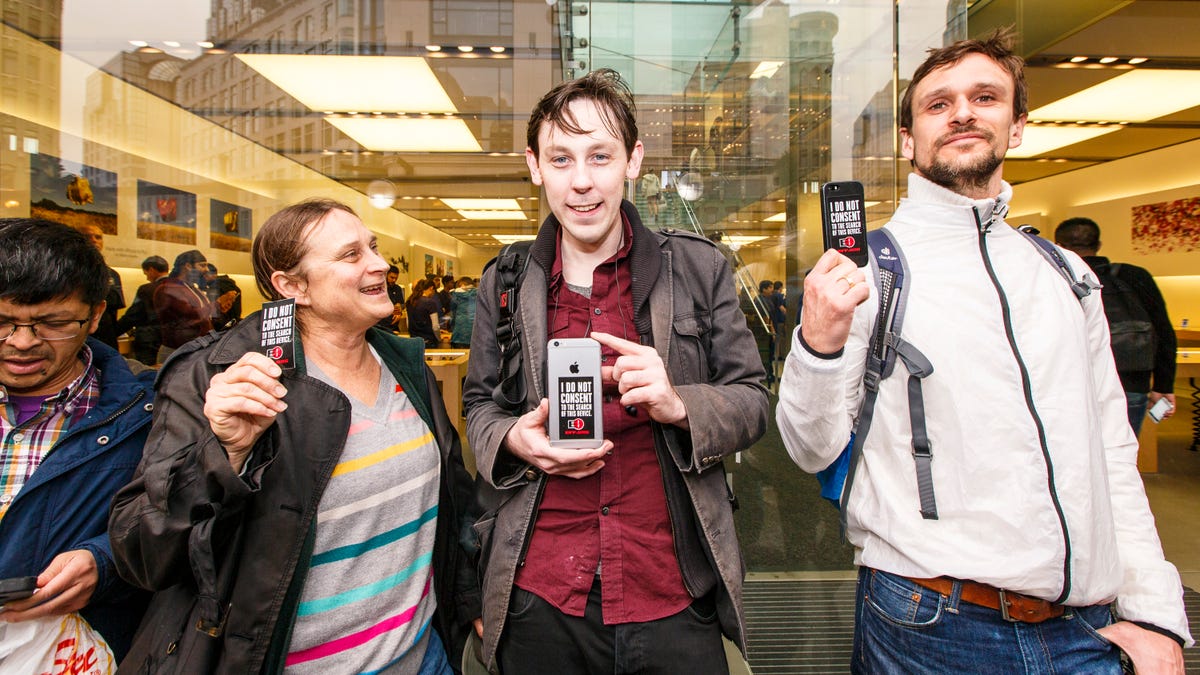Apple gets to fight judge's iPhone-cracking order another day
Court delays a deadline for Apple to respond to an order to help the FBI break into an iPhone tied to the San Bernardino terror attack. The feds say Apple's stance is based on "brand marketing."
Apple for the moment has three extra days to prepare for its defiance of a federal court order.
In a high-profile case, a federal judge in California earlier this week ordered Apple to assist the FBI in unlocking an iPhone linked to the deadly terror attack in San Bernardino, California, in December. The judge originally gave the company five days to respond in court, meaning the answer was due by Tuesday of next week.
Now that deadline has been moved later to Friday, February 26, according to Bloomberg News, which cited two unnamed sources.
The Justice Department, however, is pushing back. It has filed a motion seeking to have the court issue an order compelling Apple to comply with the original mandate to assist federal agents in their search of the device.
Apple CEO Tim Cook has already publicly declared that his company will not comply with what he characterized as a "chilling" court order. "The US government has asked us for something we simply do not have, and something we consider too dangerous to create," Cook wrote in an open letter posted on Apple's website. "They have asked us to build a backdoor to the iPhone."
The stakes here are high, with the case pitting issues of national security against regard for the privacy of everyday consumers. The standoff also turns up the heat on the simmering tensions over encryption -- the technology that scrambles information to prevent unauthorized readers from seeing it -- between Washington and Silicon Valley.
The Justice Department's filing today argues that the order would not create a backdoor, decrypt Apple's phones or give the government the power to compromise the security of personal information.
"Apple's current refusal to comply with the Court's Order, despite the technical feasibility of doing so," the filing says, "instead appears to be based on its concern for its business model and public brand marketing strategy."
Apple did not respond immediately to a request for comment. The court said it cannot comment on pending cases.
Cook has drawn support from high-tech honchos including the CEOs of Google and Twitter, along with privacy watchdogs such as the Electronic Frontier Foundation.
Criticism of the Cupertino, California, company's stance has been equally fervent. Republican presidential hopeful Donald Trump, for one, urged Apple to drop its guard. "Who do they think they are? They have to open it up," he said. "We have to use common sense."
On Friday, at a campaign event in South Carolina, Trump called for a boycott of Apple until it unlocks the iPhone in the case, according to Reuters.
To get access to the innards of the iPhone in the San Bernardino case, the FBI wants Apple to build a new version of its iOS software that would bypass the iPhone's security features and create what Cook has described as "the potential to unlock any iPhone in someone's physical possession."
The FBI is trying to access an iPhone 5C used by one of the perpetrators of the December terrorist attack in San Bernardino that killed 14 people and injured 22 others. Cook said Apple engineers have been working with the FBI since the attack and have "offered our best ideas on a number of investigative options at their disposal."
The FBI's plan would bypass security functions that limit how many times you can enter an incorrect password. Currently, an iPhone wipes itself if the wrong password is entered 10 times in a row. With that feature disabled, investigators could enter password after password until they hit on the correct one.
Apple is willing to challenge the government all the way to the Supreme Court, according to CBS News, citing unnamed sources. (Editors' note: CBS is the parent company of CNET.)
Update 10:22 a.m. PT: Added response from the court. And 12:29 pm PT: Added information on the Justice Department filing. Additional reporting by CNET News' Terry Collins.


